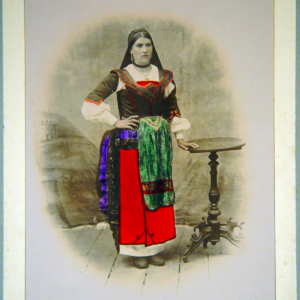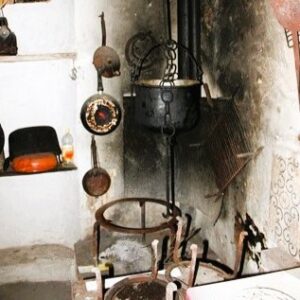taken from the lexicon of Conflenti
Author: Vittoria Butera
Recovering the local dialects and the cultures produced by the people who speak them means not only safeguarding a substantial baggage of our history to be passed on to future generations but also maintaining linguistic tools capable of expressing a different point of view to the national language and to provide a different perception of reality. The path of words, and of all that is connected to human ideas and behaviors, is long and rich in history. Symbols, graphic signs, rites, myths, and legends respond to various needs, in particular the need to feel part of an ideology, a group, a people, or a religious faith. Christianity satisfies the need of belonging of its followers not only with the fideistic contents and with the sacramental rites but also with a forest of symbols. As happens in the transition between cultures, Christianity has inherited a large part of its emblematic heritage from the religious complex of the ancient world; it has carried out its reshaping and grafted its values there. Even the birth of Jesus, the most important of his events, was superimposed on the feast of Mithras or the rising sun which coincides with the rising of the sun after the shortest day of the year on December 23. The continuity of antithetical cultures such as the Christian and the so-called pagan one occurs both for the difficulty of eradicating consolidated behaviours and remote conceptions and for the lack of a proper sign patrimony on the part of the nascent religion.
In following the traces of rites and signs through the ages, the adaptation in the link between the epochs and the subsequent changes in the same Christian centuries emerge. It is a fascinating journey because it makes the sense of the times; it also explains the current persistence of words and surviving behaviors.
The words in their long path undergo mixing and stratification and, while remaining adherent to the roots, adapt to the eras that cross and the distinctive features of the population that uses them. Far from being purely formal, the use of words responds to criteria of content, meaning, civilization. Behind the words unfold stories of life, ideals, triumphs and defeats, falls and ascent of families and peoples. It is fascinating to follow the path of words through ethnic stratifications and phonetic corruptions; even more fascinating to look for what is behind, to see the deep meaning and indicators of local anthropology. We begin to reconstruct the historical outline of some words of Conflenti.
Abitìnu, scapular. The children wore it on the skin, under the inner shirt. In the simplest form, the moms made it as a necklace consisting of a lace with a hanging bag containing a sacred image. In some countries they also included an apotropaic symbol, such as a piece of iron (or a coin), a shell, a grain of salt. It was to protect the child from spirits, especially from Umbra. The entrustment to his guardianship was total and his presence almost innate, as if it were a second skin. The name abitìnu, from the Latin habitus, therefore assumes the translated sense of way of being, is the inner dress, the personality. The use of a similar talisman was widespread in ancient Rome: it was called crepundia and contained an image that with the gesture intimated silence.
Addrupeddratu, Allupellatu. It has to do with the atavistic fear of the wolf. In a literal sense it is translatable as allupate, hungry like a wolf, but belongs to the semantic field of pain, and like other words of this meaning is strongly onomatopoeic. It comes from the Greek root ol of ollumi (destroy)+ lype (pain), and it means destroyed by pain; it denotes a person afflicted by such a serious suffering to manifest it physically, as if it were printed in his body.
Brache, panties. In the ironic nuance it became brachesse, brachessine. The ironic nuance comes from the ancient Greeks who pronounced the word brakai with contempt because they were the calzones used by various barbarian peoples, including Gauls, Persians, Scythians.
Cattiva. In local bad language is the widow. From captive (Latin capio: to take, capture), means prisoner. It is connected with the idea that the widow is a prisoner of death, that is, of her dead husband; this status prejudiced a second marriage. The widow had to show her marital status in traditional clothing, wearing black cloth throughout her life: prisoner of death and colors.
Civilizze. It is a word born from the sensitivity of beauty, of kindness, of the refinement of individual and collective feeling. It is part of the expressions of civilization, common to the Calabrian dialects, which attest to an ethnic aspect transmitted through generations. Civilizze expresses expressions of affection, especially hospitality, hospitality. It reports to the ancient Greeks that they had a special institute of proselytization for the reception of guests, who considered sacred and entrusted the protection of the highest Olympic deity of Zeus. It is significant that the Calabrian culture, inheriting this conception identifies with civilization itself the rites of welcome and good education. Vittorio Butera uses it in ‘A Staffetta to communicate with a single word the entire complex of hospitality: centrality of the guest, maximum attention to his person, offering delicious food, interpretation of wishes, hospitable gifts, entertainment.
Empuse, from the Greek empaizo (mocking), were invisible figures that appeared in the feminine aspect in the crossroads to make jokes of bad taste to passers-by.
Erramu and spatornatu, respectively: from the Greek errama (from errapto) which means piece sewn on, ie patched; and from the Greek spao (which includes the meanings of torment, psychological and physical tear…;), so the expression denotes both material poverty and psychological deprivation.
Fullùne. wrap of rags, which was used to collect the proof of virginity. It comes from the Greek fulloma, which means foliage and highlights the connection between vegetation and virginity. One or two days before the wedding, the two relatives, who were supposed to prepare the wedding bed, placed it between the mattress and the sheet. In some countries it was not used because the proof had to remain on the sheet that would be laid on the balcony to exhibit to the community the virginity of the bride.
Gabbu. A strong contribution to the connotation of the past society, of its primitive cultural heritage is provided by the word gabbu (‘u gabbu), that is, the shame, for which people strictly observed community values to win esteem and avoid the shame of shame. This ideology brings us to the archaic Greek world, which the English philologist Eric Dodds (“The Greeks and the irrational”) classifies as a “civilization of shame” distinguishing it from “the civilization of guilt”. The “civilization of shame” is the Homeric one. Homeric heroes act according to the criterion of the consideration that their actions can arouse in others; what they want to avoid is the shame (aidòs) that generates the blame. In the “civilizations of shame” it is felt as unbearable all that by “losing face” exposes man to ridicule and contempt of his fellow men. Ettore confronts Achilles knowing he is going to his death so as not to be ashamed in front of the Trojan women. From archaic Greece, the society of shame has reached the communities of our recent past, when behaviour deemed unsuitable for Community models was repressed from a very young age to avoid being marginalized. The transgression of norms by a person contaminated the whole family and in the most serious cases the whole parental group. Gabbatu/a. Despite having the same etymology as gabbu, it belongs to an area of different meanings. This word applies to those who are deceived, those who are deceived by people they trust. If the deception is such that a wise person should realize it, then the adjective gabbatu passes into the area of the stupid: ciùotu, ciotàle, ciotarrùne, ‘nu buonu Jugàle.



